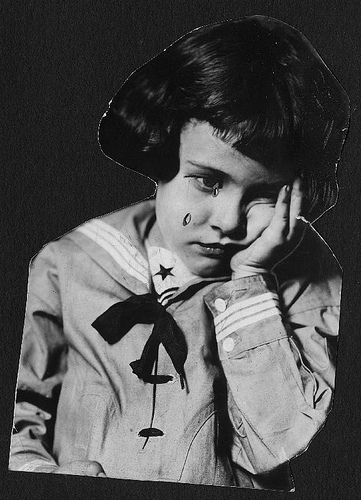 I am naturally pessimistic. I am persistent and I keep trying and trying and working to change whatever I think needs to be changed, but my default setting is pessimism. I feel I was born like that – I have certainly been like that for as long as I can remember. I’m not sad or even miserable most of the time but I usually think everything will go belly-up as opposed to thinking it’ll all work out. It’s as if inside me I have a permanently raised eyebrow…
I am naturally pessimistic. I am persistent and I keep trying and trying and working to change whatever I think needs to be changed, but my default setting is pessimism. I feel I was born like that – I have certainly been like that for as long as I can remember. I’m not sad or even miserable most of the time but I usually think everything will go belly-up as opposed to thinking it’ll all work out. It’s as if inside me I have a permanently raised eyebrow…
As a result, I have always found being told to be positive very hard to take. It is just too simplistic for my convoluted, pessimistic inner cynic to accept. And anyway, I don’t believe that formulaic approaches work for us human beings – not really. Not in the long run. These ‘quick fix’ formulae might apply a veneer of positivity – or even civilisation – but unless we take ideas deep inside ourselves the fundamental reality of who we are doesn’t really change. With any pressure we flip back into our default position – whatever that may be – and all the veneer cracks and falls away.
Which is why I found this video interesting. It is the first time I have ever really seen a simple bespoke approach to being positive. It suggests a technique but not a one-size-fits-all technique and so it just might work in my (pessimistic) opinion.
But even if your eyebrows are in your hairline and you don’t think it’ll work, you might still find it interesting.
Have a look.
“It’s as if inside me I have a permanently raised eyebrow…”
Trisha, I think the fact that you know yourself so well means you’ve already won half the battle. Now you just need to find ways to accept and value those traits you once believed you needed to change (I’m talking to myself here, too). As you said, with any pressure, we fall back into our default position. There must be a reason for that. Your particular collection of attitudes, beliefs, and quirks is important, and irreplaceable.
I like the video, but whenever I hear that word, positive, I wonder what it means. It seems fuzzy and subjective, and therefore hard to measure. Yes, there are extremes that can be easily labeled, but life is more complicated than that. Even your use of the word pessimism, I bet, doesn’t really describe you. The very fact that you’ve tried to change it suggests that you have an optimistic side.
Thank you for writing this. It really woke up my brain.
I totally agree about working with ourselves as we are – at this point in my life I am positive that there are many things about me that aren’t ever going to change and that that’s just the individual way I am – that’s true of all of us. I also agree that it’s not just a warts-and-all scenario but quite a good thing that we have our quirks and idiosyncrasies – I love the oddness of individuals – life would be unbearably boring otherwise.
I also like your description of the word ‘positive’ I think that just about sums it up for me too. But self-accepting as I am (and I really am, mostly) I have some traits that need modifying – pruning even 🙂 The task seems to me that I need to constantly work out which parts are quirks and which parts correctable faults – even then it’s not as simple as that because a ‘fault’ in one circumstance can be a strength in another – but even so… Self-knowledge is the thing really, alright.
Thank you so much for your comment, Charles and your kind words – I’d like to think something I wrote woke up your brain but I imagine that your brain is already awake anyway!
I don’t know how I missed this one… I was listening to a show on NPR and the guest, a Nobel Prize scientist, was talking about how his work is on isolating the gene that makes us either happy or sad… It was fascinating discussion but I had to leave so I missed the end. There’s genetics and then our nature and actions. It remains a complex subject though. 😉
That really is true! Interesting, though. Thanks, Elizabeth.